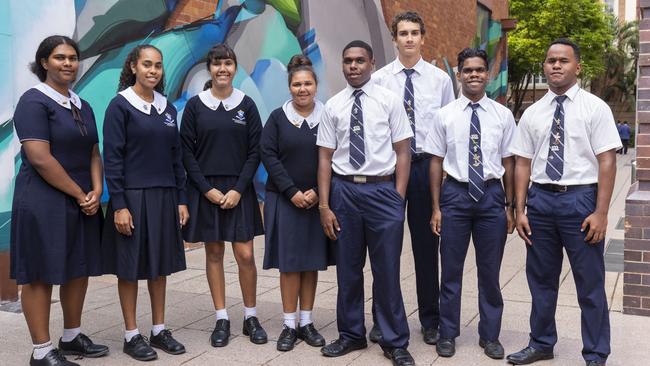Indigenous student boarders handling Covid-19 well

Covid-19 made schooling particularly difficult last year, yet AIEF scholarship students achieved a 96 per cent retention and Year 12 completion rate, our highest rate in the past 11 years. Students from remote and very remote communities had the highest rates of annual retention and Year 12 completion with a rate of 99 per cent last year.
From schools purchasing Wi-Fi devices to ensure students could learn from home to students in remote islands and outback towns being sent homework via courier, in tough times the AIEF community rose to the challenge.
The challenges are not over. Home schooling has re-emerged during Sydney’s lockdown and the rollout of vaccinations poses particular issues for students in boarding schools, which have been likened to aged-care facilities by Australian Boarding Schools Association chief Richard Stokes.
AIEF is proud of the outcomes and efforts of all scholarship students, who continue to demonstrate compassion, maturity and fortitude in the face of shifting challenges. They have shown us that they want to be at school – learning, growing and working to fulfil their ambitions.
AIEF is cognisant of the vulnerabilities of Indigenous communities our students and alumni come from. The government recognises this too, having made Indigenous people aged 16 and older eligible for the vaccine. As Indigenous Australians Minister Ken Wyatt has pointed out, Indigenous Australians experience a burden of disease 2.3 times the rate of other Australians, which increases risk of severe illness from the virus.
It is hoped that vaccinations will prevent a repeat of situations seen last year when boarding school students were separated from their families, unable to go home during holidays because of border closures, while also helping to keep them and their communities safe when they do go home.
Indigenous education is such a national priority that we must forge a path through the challenges of Covid. The Morrison government soon will announce the implementation plan for the new National Agreement on Closing the Gap, signed 12 months ago, with 17 socio-economic targets designed to improve outcomes for Indigenous Australians.
Several of the key pledges are about ensuring Indigenous students achieve their full potential through Year 12 completion and engagement with further education and employment pathways. It is well established that completion of Year 12 is directly linked to improved personal development, employment, health and wellbeing outcomes. Indeed, education is about the power of possibility, and as Scott Morrison has declared in parliament, “we can achieve generational change through education”.
A recent report by Glenn Fahey from the Centre for Independent Studies recommends greater sharing of successful practices in the Indigenous education space. Since AIEF started with one student on a scholarship in 2008 it has provided scholarship funding for more than 1000 Indigenous students from more than 400 communities and additional support to help them make a successful transition to employment, with success rates consistently above 90 per cent.
For TJ, learning from home during Victoria’s lockdown meant grappling with a three-hour time difference. Now a Year 12 student at Melbourne Grammar School, TJ would wake at 5am to ensure he was ready for online lessons from his home in Derby in the Kimberley region of Western Australia.
In the Northern Territory, Kirrah’s family didn’t want her to miss the first day of term three after she had to learn from home during term two because of restrictions. With no direct flights from their home town, Kirrah’s parents drove 33 hours from Katherine to Adelaide to make sure she got back to the classroom at Seymour College to learn with her friends.
AIEF has more Indigenous families seeking opportunities for their children to have a world-class education than it is able to support with its existing funds, and it has a formidable graduate network of Indigenous leaders in all walks of life, acting as role models for the next generation, leading change in their communities.
AIEF’s vision is to continue to support Indigenous students to realise outstanding outcomes in Indigenous education so that they can achieve the generational change the Prime Minister has prioritised.
Andrew Penfold is executive director of the Australian Indigenous Education Foundation.



While Covid-19 continues to have a great impact on all our lives, in such challenging times Indigenous students supported by the Australian Indigenous Education Foundation continue to flourish.